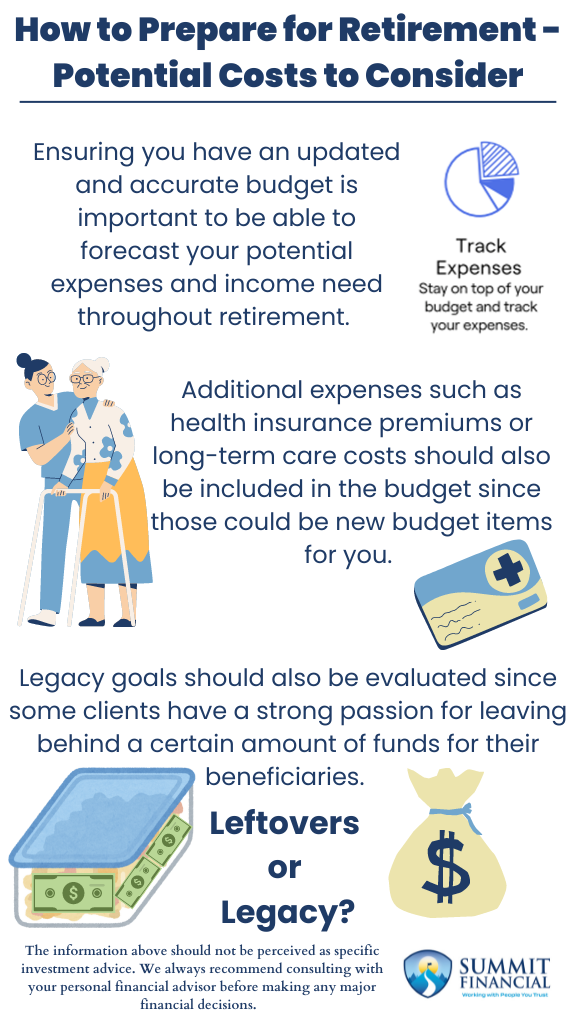Meeting with your personal advisor can not only bring financial peace of mind to the decision but can also potentially alert the client of any pitfalls that may be present in their current plan. Thankfully, our firm uses a very robust system that allows us to view a client’s current financial picture, long-term forecast for retirement, potential investment pitfalls, impacts of tax planning strategies, and much more.
There is a lot of information that goes into constructing a retirement plan, and even more analysis can be done after the data is inputted. The main concern is whether or not the client has enough assets to provide income, above and beyond benefits from other sources such as Social Security or pensions, to fulfill their annual/monthly expenses throughout their projected retirement timeline.

Gathering Accurate Financial Data
Your personal advisor should have access to your current financial picture, including investment assets. Social Security benefits can be retrieved from https://www.ssa.gov/ and any potential pension benefits should be found within the most recent plan statement. The last part of the retirement equation is how much the monthly or annual expenses are for the client. It is important for this info to be accurate since a miscalculation could easily derail a retirement plan.
Your plan may be successful if you guess and say you only need $5,000 per month, but if that number ends up being closer to $8,000, then you may not have enough assets to fulfill that need throughout the full length of your retirement. This could potentially result in a shortfall of assets or income at the end of the plan.
For additional insight, please refer to our previous budgeting blog. Your advisor, or our retirement planning software, can help your calculate your income need. Alternatively, it also allows you to adjust the income needed to see at what level of expenses the plan becomes sustainable and successful.
Incorporating Legacy Goals into Your Plan
There are some additional expenses that you may not consider when trying to calculate your monthly budget, but it is important that these items are not overlooked.
First, it is important to have adequate health insurance premiums, including Medicare, factored into the costs. Many clients have had employer sponsored health insurance and have not had to pay for their coverage, so this is a common expense that we see clients do not always think about when calculating their budget.
Next, the longevity of the clients is very crucial since this determines how many years of income will need to be provided for. Average life expectancy in the U.S. is just below 80 years, but that can certainly vary from person to person depending on their current health and family history. We prefer to overestimate life expectancy since improvements in technology and medicine have the potential to continue to extend this average, and we would rather err on the side of caution so that a client has the assets needed in case they live longer than anticipated. In addition to this, we want to consider long-term care costs as a potential factor in the retirement plan.
Not everyone needs long-term care, but it can be very costly if it is needed. Our system has the ability to forecast the national average cost and build that directly into the retirement plan so that we can ensure some funds are available should the need arise down the road.
Weighing Legacy Goals Against Retirement Readiness
Lastly, one of the major expenses that should be considered for a retirement plan is any desired legacy or inheritance amount. Some clients are fine with leaving whatever is left over to their heirs, but others have a specific goal that they want to leave X amount of money behind.
If a client has a specific legacy goal, then that means those assets cannot be used for income during their retirement. This could also be thought of as a large one-time expense that occurs right at the end of the plan. Obviously, the larger the legacy goal, the more assets that will be needed before the client can successfully retire. There are times when a client will need to decide if leaving a legacy is worth them continuing to work for extra years. This would come down to the client weighing the two decisions, leaving a legacy or retiring now, and determining which is a higher priority goal for them.
Retirement Budgeting Considerations: Key Takeaways
- Ensuring you have an updated and accurate budget is important to be able to forecast your potential expenses and income need throughout retirement.
- Additional expenses such as health insurance premiums or long-term care costs should also be included in the budget since those could be new budget items for you.
- Legacy goals should also be evaluated since some clients have a strong passion for leaving behind a certain amount of funds for their beneficiaries.
Financial Planning and Review Meeting
If you have any questions about retirement planning, tax strategies, our 401(k) recommendation service, or other general questions, please give our office a call at (586) 226-2100. Please feel free to forward this commentary to a friend, family member, or co-worker. If you have had any changes to your income, job, family, health insurance, risk tolerance, or your overall financial situation, please give us a call so we can discuss it.
We hope you learned something today. If you have any feedback or suggestions, we would love to hear them.
Zachary A. Bachner, CFP®
with contributions from Robert Wink, Kenneth Wink, James Wink, and James Baldwin
Sources:


